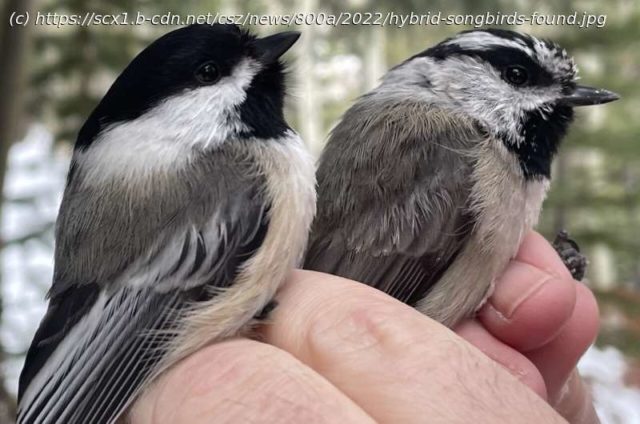Hybrids of two common North American songbirds, the black-capped and mountain chickadee, are more likely to be found in places where humans have altered the landscape in some way, finds new University of Colorado Boulder research.
Hybrids of two common North American songbirds, the black-capped and mountain chickadee, are more likely to be found in places where humans have altered the landscape in some way, finds new University of Colorado Boulder research.
Published today in Global Change Biology, it’s the first study to positively correlate hybridization in any species with landscape changes caused by humans, and the first to examine this relationship across an entire species‘ range—spanning almost all of western North America.
The paper also contradicts a long-standing assumption that these two birds rarely hybridize, finding instead that black-capped and mountain chickadee hybrids (identified using genetic tools) occur across the United States and Canada.
„These are common birds. If you go anywhere in North America, you’ll find a chickadee,“ said Kathryn Grabenstein, lead author on the study and postdoctoral associate in ecology and evolutionary biology. „And what we’re finding now is that if you see a chickadee in a place where both black-capped and mountain chickadees live, they’re probably at least a little bit of a hybrid chickadee.“
Hybridization—the interbreeding of closely related species to produce mixed ancestry offspring—is common in the development of life on Earth and is thought to be especially important in the evolution of plants. This new analysis of songbirds adds to the growing body of evidence that hybridization is also quite relevant within vertebrate evolution.
Human disturbance
What this study cannot say is why these chickadee hybrids are more common in places where humans have changed the landscape, but it is the first-of-its-kind to examine this correlation separate from climate change.
Climate change often changes the range of a species—where it lives, roams or migrates—bringing species into contact with one another that would not normally interact, which can lead to hybridization. In contrast, this study looked at two related species whose ranges already overlap and focused on the variable of human „disturbance,“ such as building cities, clearing land, planting trees, creating reservoirs and noise pollution.






